Toutes les informations dont vous avez besoin, en un coup d'œil !
Nos articles et autres rapports, sont détaillés et bien documentés. Ils permettent de prendre le pouls des évolutions du marché et de garder une longueur d'avance.
Inscrivez-vous à notre newsletter afin de recevoir toutes nos informations exclusives et ne jamais manquer un article.

This article explores how in-house strategy and transformation teams are shifting from large, generalist functions to lean, senior cores supported by on-demand interim expertise.
Over the past 18 months I’ve noticed something interesting inside in-house strategy and transformation teams.
Strategy and transformation teams are being redesigned; not quietly, but structurally. Where once the model was a sizable in-house strategy function with broad generalist capability, the emerging pattern is smaller, more senior teams that draw on external expertise and interim execution support as needed.
It’s not a ‘nice to have’ shift, it’s becoming the operating model of choice for companies that need to move faster than traditional headcount cycles, while keeping fixed costs low and flexing resources up or down as ROI dictates. This approach is especially popular in tougher economic climates.
Why the old model is under pressure
Corporate headcount processes are slow. Approving a director-level strategic hire can take months, involves multiple stakeholders, and, especially in tighter economic conditions, is increasingly viewed through a cost and risk lens: ‘Do we really need this role full-time and permanently?'
At the same time, the complexity of strategic work is rising. Pricing requires specialist competence. Go-to-market design now spans digital, sales enablement and RevOps. CDD-style market validation is no longer only relevant to private equity, corporates are now using it to justify investment, M&A and new product bets.
Matching that level of sophistication with a full-time team across every dimension is expensive, slow and, in most cases, unnecessary.
Why interim is no longer a compromise
Ten years ago, interim talent was seen as a stopgap. Today, that perception has flipped.
There is now a substantial and growing interim talent pool, ex-consultants, former BU leaders, transformation specialists, commercial operators, pricing experts, and industry CxOs who are choosing project-based work over permanent roles. The sheer quantity of high-quality professionals available for projects has fundamentally shifted the market, and their expertise often surpasses what corporate recruitment processes can surface within the same timeframe.
Three key factors driving the rise of interim and project-based work at senior levels:
- Career optionality: Many senior operators now prefer portfolio careers over permanent employment, embracing a mix of projects and permanent roles. The stigma of a “gap on your CV” has faded, moving between permanent and project work is increasingly seen as a valid, fluid career path, often serving as a “try before you buy.”
- Remote-first work: Geography no longer limits supply. Talent can now be sourced globally, giving companies access to the best people regardless of location.
- Demand sophistication and market dynamics: Corporations are far more precise in articulating what they need, e.g., “pricing diagnostic + packaging,” “CDD-style market sizing,” “RevOps strategy”, which maps perfectly to interim engagements. At the same time, more projects in the market create a virtuous circle: increased project opportunities attract more high-quality professionals to this way of working.
Movemeon Hiring Index shows that the freelance/interim talent market shows continued over-supply of high-quality professionals relative to roles. This reflects broader shifts we’ve documented in the market: many of the best consultants and operators are choosing project-based work for greater control over their careers, contributing to a deeper pool of available interim talent.
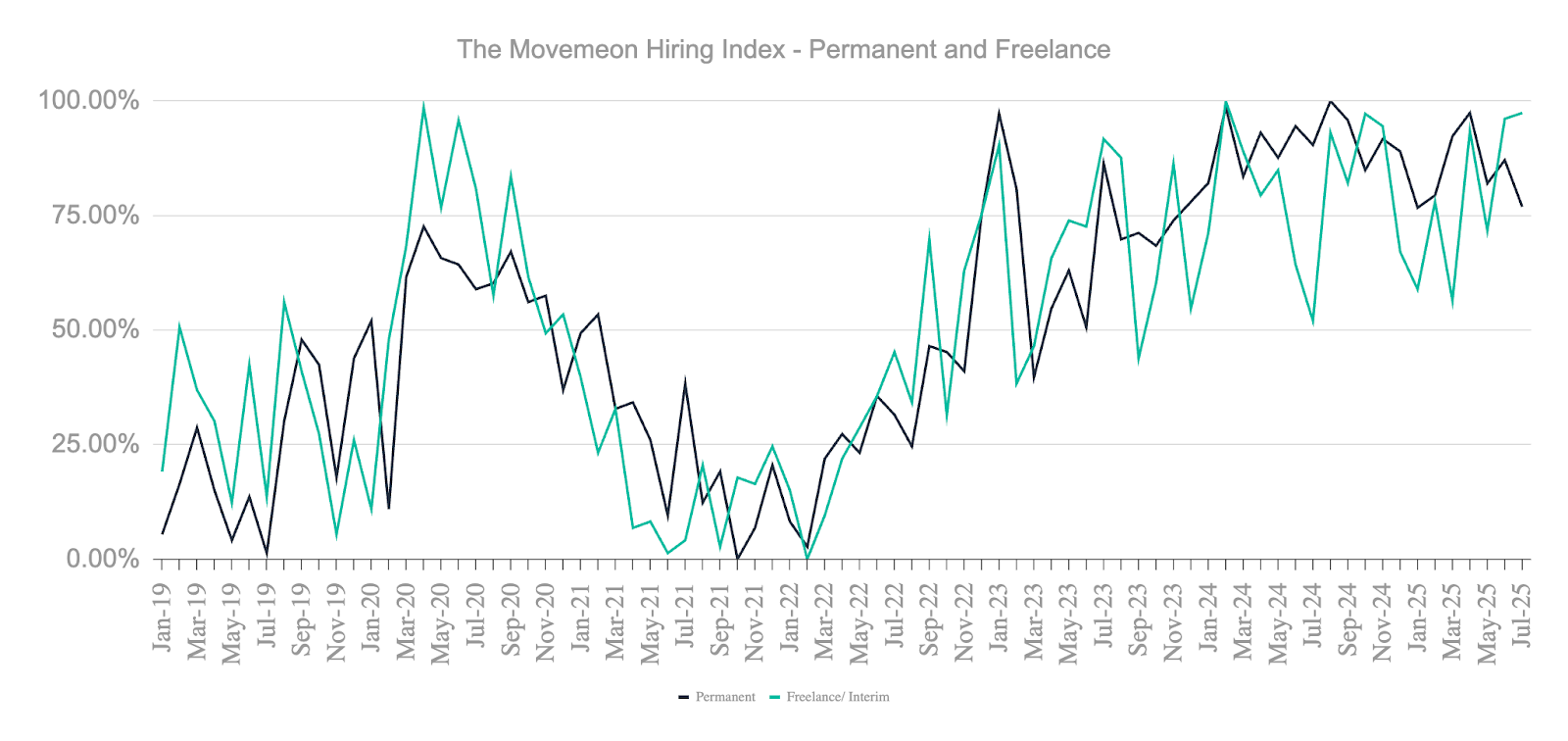
Today, interim talent isn’t simply a cheaper alternative to permanent hires, it’s the faster, more precise, lower-risk way to get specialist work done.
Many clients still underestimate how deep this talent pool is and how accessible it can be. Movemeon’s data shows that interim talent is highly cost-effective, there are no ramp-up periods or lengthy notice periods, just straight delivery, and access is rapid: clients can interview suitable professionals within 1–2 days, with many ready to start as soon as the following week.
Project-based work favours flexibility
There’s a structural point here that often gets missed: most high-value strategic and commercial work is project-based by nature.
Examples from real clients:
- Pricing reviews every 12-18 months
- Market entry or product expansion strategies every 2-3 years
- Commercial due diligence ahead of acquisitions or divestments
- Transformation PMOs aligned to specific value creation cycles
- GTM re-designs tied to one-off product launches
You would never build permanent teams to run these cycles continuously, unless you are a private equity fund or a global consulting firm. Corporates don’t, and shouldn’t, operate that way.
Cost efficiency over the annual planning cycle
A point that CFOs in particular appreciate: interim isn’t cheaper on a day-rate basis, but it is significantly cheaper over a full budget year versus FTEs.
The maths is straightforward. A corporate hiring a strategy director pays not just base salary, but NI, pension, bonus, LTIPs, managerial overhead and future redeployment risk. An interim team, even at premium day rates, disappears the moment the job is done.
Layer in the fact that strategic demand is irregular, and the logic becomes clearer: variable cost for variable work beats permanent cost for intermittent work.
A more modern operating model for strategy
The emerging structure we now see more and more:
1. A small, sharp internal strategy nucleus
- Typically 3–10 people
- Focused on enterprise priorities, capital allocation, annual strategy, board engagement, and mobilisation
- High internal connectivity, high context
2. Modular access to specialist expertise
Brought in for spikes in specific domains such as:
- Pricing and monetisation
- Commercial due diligence
- GTM strategy and sales enablement
- Customer and product strategy
- Digital and data strategy
- Restructuring and cost transformation
3. Temporary horsepower for execution
When volume matters more than niche expertise (e.g. transformation PMO, market sizing workstreams, integration projects).
This model does three things that corporates increasingly need:
Moves fast, maintains quality, and avoids adding permanent cost.
Where Movemeon fits
This is precisely the model we’re helping global corporates build, not just by supplying talent, but by advising on how best-in-class organisations structure strategy and transformation.
We do that in three ways:
1. Access to specialist expertise
Targeted specialists for very specific strategic problems, pricing, CDD, GTM, operating model design, digital & AI strategy, and transformation PMO, drawn from ex-MBB, Big 4 and senior industry operators across sectors and geographies.
Examples:
- A global media group bringing in a market analysis specialist for a 6-week sprint to size a new growth vertical.
- A major restaurant chain engaging a partnerships expert for a 4-week project to design and prioritise strategic alliances.
- A B2B SaaS scale-up appointing a pricing specialist for a 3-month engagement to redesign packaging and monetisation.
- A large logistics business bringing in an operations transformation lead for a 6-month programme during a major cost and service transformation.
2. Access to horsepower
On-demand teams of ex-MBB / Big 4 / boutique consultants to execute time-bound strategy and transformation work at pace, from growth strategy builds and PMI execution to market entry sprints and board-level strategy refreshes.
Examples:
- A Tier 1 telco deploying a small team of generalist strategy freelancers to support a board-level strategy refresh under tight timelines.
- A PE-backed industrials group standing up a temporary strategy pod to support PMI delivery across multiple workstreams post-acquisition.
- A global consumer business mobilising a sprint team to build a market entry strategy and execution roadmap for a new geography.
3. Advisory on operating model design
Insights on how the best corporate strategy functions are evolving- headcount, structure, and where interim makes sense.
The outcome is not a new buzzword, it’s simply a more modern way to run strategy: leaner, faster, and tuned to how work actually gets done.

How specialist-led teams of independent experts are outpacing traditional firms in delivering value creation, and what this means for portfolio company success.
If you've worked in private equity over the past 18 months, you've felt it: something fundamental has shifted in how portfolio companies approach consulting support. The old playbook - engage a MBB or Big Four firm, deploy a large team, run a 12-week sprint - is giving way to a very different model.
The data tells the story clearly. McKinsey reduced its workforce from 45,000 to under 40,000 over 18 months, with plans for further cuts of up to 10% in some functions.12 Meanwhile, boutique consulting firms are achieving profitability margins of 50-70% (the industry average sits at 20-40%3). Clients increasingly demand hyper-specialised expertise over broad-stroke advisory work, forcing a fundamental rethink of how consulting value is delivered.
For private equity funds and their portfolio companies, this disruption creates both challenge and opportunity. The question isn't whether the consulting model is changing - it's whether you're positioning your portfolio companies to benefit from what's replacing it.
The Six Forces Reshaping Consulting for Private Equity
Traditional consulting firms built their businesses on a simple premise: brand credibility plus methodology frameworks equals premium pricing. Whilst that still applies to diligence projects, for value creation that equation is breaking down, driven by six interconnected forces:
- Clients now buy outcomes, not logos. When you're operating against a value creation plan with clear EBITDA targets and exit timelines, the name on the consultant's business card matters far less than whether they've delivered similar transformations before. Portfolio company boards and PE operating partners increasingly judge success by results achieved rather than the reputation of the firm engaged.
- Complexity demands specialists, not generalists. Modern transformation challenges in portfolio companies - whether it's an integration of a B2B SaaS business, the creation of a procurement function in manufacturing, or an Operating Model for a business that's grown through acquisition – they all require deep, hands-on expertise from practitioners who have solved precisely these problems before. Broad methodologies delivered by smart generalists who'll learn your industry on your time simply doesn’t cut it anymore
- Senior expertise is no longer optional. Portfolio companies expect experienced leaders to be directly embedded in the work, making decisions in real time and owning delivery - not providing periodic oversight from London or New York whilst junior consultants do the heavy lifting on site. When the Chief Transformation Officer or Transformation Director is evaluating consulting partners, they want to know exactly who will be in the room making it happen.
- Speed matters more than scale. In an environment where time literally equals value creation, portfolio companies prioritise agile, senior-led teams that can diagnose issues quickly and drive momentum without the delays created by large, layered deployments.
- Cost discipline has sharpened value expectations. PE-backed companies operate under intense financial scrutiny. This has led them to favour leaner delivery models that clearly link fees to outcomes, efficiency and tangible business impact. Portfolio companies want to see exactly what they're paying for and what return they'll generate.
- Trust comes from partnership, not presentation. The most successful consulting relationships in private equity now look more like true partnerships than traditional client-vendor dynamics. Portfolio companies value honest challenge, practical collaboration and sustained involvement beyond the final deliverable.
What the Numbers Tell Us
The shift isn't just anecdotal. The consulting industry global revenue is predicted to reach $1.32 trillion by 20294 - interestingly, the growth is increasingly flowing to new types of players.
78% of Fortune 500 executives reported dissatisfaction with strategy-to-execution handoffs in 2024,5 highlighting exactly where traditional firms are losing ground. When your portfolio company has 36 months to triple EBITDA, you can't afford a strategy that dies in the handoff between slides and implementation.
The independent consulting market has grown accordingly. The number of full-time independent consultants grew by 6.5%, reaching 27.7 million in 2024.6 These aren't just freelancers filling gaps - many are senior leaders from top firms who've chosen to work differently.
For private equity specifically, the implications are profound. Firms are now managing portfolios with median hold periods of 3.8 years (the highest level since 20117) whilst also sitting on the potential of over 30,000 unrealized portfolio companies.8 This creates intense pressure to extract maximum value in compressed timeframes. The capability gap has reversed: specialised providers are often ahead of the traditional players in the very capabilities Private Equity firms most need.
A Different Model: Specialist-Led, Independently Delivered
What's emerging to fill the gap isn't simply ‘smaller versions of big firms.’ It's a fundamentally different delivery model built around three core principles.
- Deep specialist leadership. Rather than partner oversight with junior delivery, the new model puts genuine subject matter experts - people who've led similar transformations multiple times - at the centre of the work. These specialists bring not just knowledge but judgment: they've made the mistakes before, they know where the bodies are buried, and they can move quickly because they're pattern-matching against real experience rather than working from first principles.
- Hand-picked independent experts. Around these specialist leaders, teams are assembled from a curated network of independent consultants selected specifically for the challenge at hand. Need someone who's implemented dynamic pricing in B2B distribution three times before? You get precisely that person, not whoever happens to be available in the firm's resource pool. This matters enormously in PE contexts where timeframes are compressed and there's no room for learning curves.
- Execution discipline. The most effective version of this model pairs consulting acumen with something traditional firms often lack - relentless execution discipline. The kind of pragmatism that comes from military training or operational leadership in industry, where planning is essential but only valuable if it drives action, where the mission defines the approach rather than the methodology, and where accountability means delivering the outcome, not just the analysis.
The technology shift enabling these core principles has been equally transformative. AI and software platforms have democratised access to capabilities that were once the exclusive preserve of large firms. A boutique team can now deploy the same calibre of data analytics, market intelligence, and project management tools that McKinsey uses - often at a fraction of the cost.9 AI enables small teams to punch above their weight, with two-person operations now competing for work that previously required armies of analysts.10 The competitive advantage has shifted from who has the best tools to who can combine those tools with genuine expertise and execution capability.
This new delivery model solves precisely the problems that frustrate Private Equity firms and portfolio company leaders:
- You know exactly who's doing the work because they're in the room from day one.
- The team is lean by design, not just in proposal rhetoric.
- Fees align directly with delivery because you're not supporting a pyramid structure.
And perhaps most importantly - there's no handoff between strategy and execution - the people who diagnose the problem own making it happen.
How specialist-led execution works in practice
W2 Strategy is a specialist boutique consultancy that turns strategy into action for PE portfolio companies by pairing top-tier strategy consulting experience with military-grade execution discipline.
Making It Work: What Good Looks Like
For Private Equity firms considering this approach, or portfolio companies evaluating alternatives to traditional consulting, several factors separate effective specialist-led models from the market.
The specialist leading the work should have direct experience delivering similar transformations, ideally multiple times. Not ‘led a team that did something adjacent’ but actually did the thing you need done. Whether it's post-merger integration, operating model redesign, or carve-out execution, there's simply no substitute for pattern recognition built on having solved precisely these challenges before in a Private Equity context.
This specialist expertise must then be complemented by hand-picked teams of genuine domain experts - not inexperienced juniors with vanilla experience - but practitioners with proven track records in the specific functional levers the transformation requires. The value comes from accessing curated talent networks like Movemeon’s 90,000-strong community of top-tier ex-consultants, where you can select the exact expertise you need. You get precision-matched capability, not whoever happens to be available in a traditional firm's resource pool.
The engagement should align economics with outcomes from the start. Not ‘we'll figure out value as we go’ but clear linkage between fees, deliverables, and business impact. This transparency is increasingly non-negotiable in private equity.
There should be genuine integration with the portfolio company team, not just parallel workstreams. The most effective implementations involve consultants working as part of the operating team, transferring capability whilst delivering results. This ensures value persists after the consulting team steps back.
Finally, there needs to be execution discipline: clear workplans, tight cadence, ruthless prioritisation, and relentless focus on what moves the needle on the Value Creation Plan. Strategy is necessary but not sufficient; what matters is the implementation of strategy.
The Road Ahead
The consulting industry's disruption isn't coming - it's here. For private equity firms and their portfolio companies, this creates a genuine strategic choice. You can continue engaging consulting partners as you always have, accepting the limitations of traditional models because that's what everyone else does. Or you can recognise that the market has evolved and there are now better alternatives for the kind of transformation work PE value creation demands.
The firms making the shift aren't just saving on consulting fees, though that's certainly a benefit. They're getting faster time to value, better knowledge transfer to their teams, and ultimately stronger outcomes on the metrics that matter for exits.
The future of consulting in PE isn't about brand names or methodology frameworks. It's about specialists who've done it before, leading hand-picked teams who can deliver it now, with the execution discipline to make it stick. That future has already arrived - the only question is whether you're ready to benefit from it.
Access the right specialists, exactly when you need them
Movemeon connects Private Equity firms and portfolio companies to a curated community of 90,000+ top-tier independent consultants, enabling precision-matched expertise without the cost or complexity of traditional consulting models. Explore how Movemeon supports PE value creation.
Movemeon partners with specialist boutiques like W2 Strategy, to deliver high-impact projects for Private Equity portfolio companies. If you're interested in exploring how specialist-led, independently delivered consulting can accelerate your value creation plans, we'd welcome a conversation.
Sources
Footnotes
- Consulting Point, "McKinsey slashes 10 per cent of jobs in major overhaul," July 2025. McKinsey reduced its workforce to 40,000 over 18 months, down from 45,000. ↩
- The HR Digest, "McKinsey Job Cuts Predicted for 2026, with AI Ambitions to Credit for the Change," December 2025. McKinsey contemplating job cuts affecting nearly 10% of non-client-facing staff. ↩
- Consulting Success, "54 Consulting Statistics For 2025," August 2025. The industry average gross margin for boutique consulting firms is 20-40%, with high-performing firms achieving margins of 50-70%+. ↩
- Expert Network Calls, "Consulting Industry Trends and Outlook for 2025," October 2025. The consulting market is projected to reach US$1.06 trillion in 2025 and US$1.32 trillion by 2029. ↩
- Sarvārth, "How Boutique Consulting Is Winning In 2025," June 2025. 78% of Fortune 500 executives reported dissatisfaction with strategy-to-execution handoffs in 2024 surveys. ↩
- Bernard Business Consulting, "The Consulting Industry in 2025," February 2025. The number of full-time independent consultants grew by 6.5%, reaching 27.7 million in 2024. ↩
- Cherry Bekaert, "Private Equity Mid-Year Trends in 2025," August 2025. The median hold time for assets still in portfolios stands at 3.8 years, the highest level since 2011. ↩
- Dealroom, "Private Equity Statistics 2026," 2025. By March 2025, firms were holding more than 30,000 portfolio companies. ↩
- Expert Network Calls, "Consulting Industry Trends and Outlook for 2025," October 2025. Remote delivery has democratized access to top-tier consultancies, forcing traditional firms to compete on digital fluency rather than brand legacy. ↩
- Virtasant, "Does AI in Consulting Spell Democratization … or the End?" 2025. A two-person team armed with the right AI tools can now compete for contracts that previously required armies of analysts. ↩

Private equity returns increasingly depend on appointing a Chief Transformation Officer who can turn the investment thesis into measurable operational and commercial results at pace.
Private equity returns have become increasingly dependent on operational execution. Higher interest rates, sustained inflation and greater deal competition mean that financial engineering alone is no longer enough to deliver the required outcomes. The value-creation agenda now demands focused leadership with the authority and capability to execute change at pace.
Bain & Company has found that appointing a dedicated Chief Transformation Officer increases value realisation by around 24%, underscoring the importance of leadership focus and delivery accountability in complex transformations.
The shift in how returns are created
Over the past decade, the strongest performers in private equity have been those who drive EBITDA expansion through commercial and operational excellence. Industry research consistently highlights three trends:
- A growing share of value now comes from revenue growth and margin improvement rather than leverage or multiple expansion.
- Execution discipline is the differentiator between plans that achieve their targets and those that do not.
- Early intervention, ideally from day one post-close, materially improves success rates.
A transformation leader with a clear mandate is central to achieving these results.
What a CTO provides that others cannot
A CTO is not another project manager or a consultant working in parallel to management. The role exists to ensure the investment thesis is delivered in full. The core responsibilities typically include:
- Translating value-creation ambition into a practical, sequenced plan with measurable outcomes.
- Establishing governance, accountability, and a cadence that ensures progress is continuously tracked and issues are resolved quickly.
- Coordinating initiatives across functions to prevent bottlenecks and eliminate activities that do not move the financial needle.
- Creating transparency for the board and the fund on delivery against EBITDA, cash and milestones.
- Building internal capability so that improvements are sustainable through exit and beyond.
This focused leadership removes drift, accelerates decision-making and protects momentum.
Why this matters specifically in the PE context
PE-backed companies operate under a unique set of constraints. Timelines are compressed, expectations for EBITDA improvement are high, and organisational bandwidth is often scarce. At the same time, there is frequently a need for significant change in leadership behaviour and in the way the organisation operates on a day-to-day basis.
In this environment, dividing transformation leadership across the CEO, CFO and external advisors leads to a lack of clarity on ownership. A CTO solves that problem by making one person accountable for value delivery.
Characteristics of an effective CTO
The most successful individuals in the role typically bring:
- Operational credibility and P&L understanding
- Prior exposure to transformation programmes in complex environments
- Strong commercial judgement alongside cost and cash discipline
- Experience working directly with boards and investors
- The ability to lead change with a mix of authority and pragmatism
They combine the structured thinking of strategy consultants with the delivery focus of seasoned operators.
Impact on exit outcomes
A well-run transformation programme increases both earnings and buyer confidence. This means ensuring that performance improvements are verified and repeatable, that growth levers are actively in motion and well governed, and that organisational capability is stronger at exit than at entry. It also involves reducing reliance on external specialists over time. The result is higher valuations and lower execution risk during diligence.
Conclusion
In today’s environment, a clearly empowered Chief Transformation Officer is one of the most effective ways to convert the investment thesis into realised returns. Funds that make this capability a standard component of their operating model are consistently achieving better outcomes than those who rely on fragmented responsibility and hope that plans will deliver themselves.
The role should no longer be considered optional. It is fundamental to modern private equity performance.
If you’re thinking about strengthening transformation leadership in your portfolio, Movemeon works with PE funds to identify and place proven CTOs and transformation leaders who deliver value at pace. Get in touch to discuss your requirements.
.png)
Talent supply tightens as PE demand surges: Inside Q4’s hardest hiring market in two years, where Private Equity accelerates, scale-ups hold steady, and Large Enterprises struggle to attract strategy and transformation talent.
This report marks the fourth installment of Movemeon’s Quarterly Hiring Analysis, a regular update designed to help hiring managers and candidates stay ahead of the market across Private Equity, VC-backed scale-ups and large Enterprise businesses. Our insights are powered by over 2.2 million data points from the Movemeon platform, giving you a clear picture of how candidate interest and hiring demand are shifting.
At the heart of this analysis is the Movemeon Hiring Index, a scale from 0 to 100 that reflects how attractive the job market is for employers. In short: a higher index means higher candidate interest per role. When the economy slows, candidate supply tends to rise, pushing the index up. When hiring demand picks up and candidate availability falls, the index drops.
The Strategy and Transformation Hiring Index dropped to 68% this quarter. This is the lowest value, signalling the hardest market to hire in, that we’ve seen for two years.
The driver of this hardening of the market seems to be two fold. Firstly, there has been a sharp uptick in demand for talent from Private Equity. The combination of an increase in deals (Q3 was a record), and the increasing focus on using talent as a key driver of Portfolio business performance, has resulted in the increase in demand. Secondly, we’ve seen candidates less attracted to working in Large Enterprise businesses, resulting in a harder market for Corporates to hire.
We conclude the article by reflecting on what we think might happen next. In short, given the amount of PE Funds awaiting to be deployed, we find it highly unlikely things will abate. If anything we expect this market to continue to harden into Q1.
The Movemeon talent index
The Index is designed to give employers a read on the talent market: is it competitive? Are candidates open to new roles? Are certain industries or job types seeing more traction than others?
Below is how the index has changed over the last five years. For context, it's worth understanding who the Movemeon community are:
- It’s global: our 90k members are based across the world, with our main hubs in the UK, France, DACH, the Middle East, APAC and the US
- Everyone has worked in a leading consulting or accounting firm: 45% are ex-McKinsey, BCG and Bain; 30% are leading strategy firms; the remainder are the Big4
- They are future leaders and Board members: consultancies make up six of the top eight "CEO factories" (companies whose alumni become CEOs of the largest businesses). And this isn't constrained to just large businesses, with a disproportionate number of unicorns founded by consulting alumni
In terms of interpreting the numbers:
- 0-25: a very hard market to hire in. Focus on retention, as replacing people is going to be hard.
- 25-50: a hard market to hire in. Be proactive and start talent pipelining for key positions.
- 50-75: a good market to hire in. Start looking to take advantage of the market, and strengthen key positions.
- 75-100: an exceptional market to hire in. Look to bring in exceptional talent that you’ll only get a few chances to snap up.


Demand now outstrips supply as the market tightens
The hiring index has fallen to 68%, the lowest level since October 2023, signalling the most challenging hiring environment in nearly two years.
For the past 12 months, the index had held stubbornly above 75%. In our last quarterly analysis, we noted that this resilience persisted even as hiring activity increased, suggesting there was still an oversupply of candidates in the market.
So what has shifted in Q4 2025?
To unpack this change, we analysed the hiring index by company type to understand the underlying dynamics driving the tightening.
Private Equity is driving a surge in hiring demand
A hiring index of 68% is the lowest we’ve seen since October 2023, signalling the hardest market to hire in for 2 years.
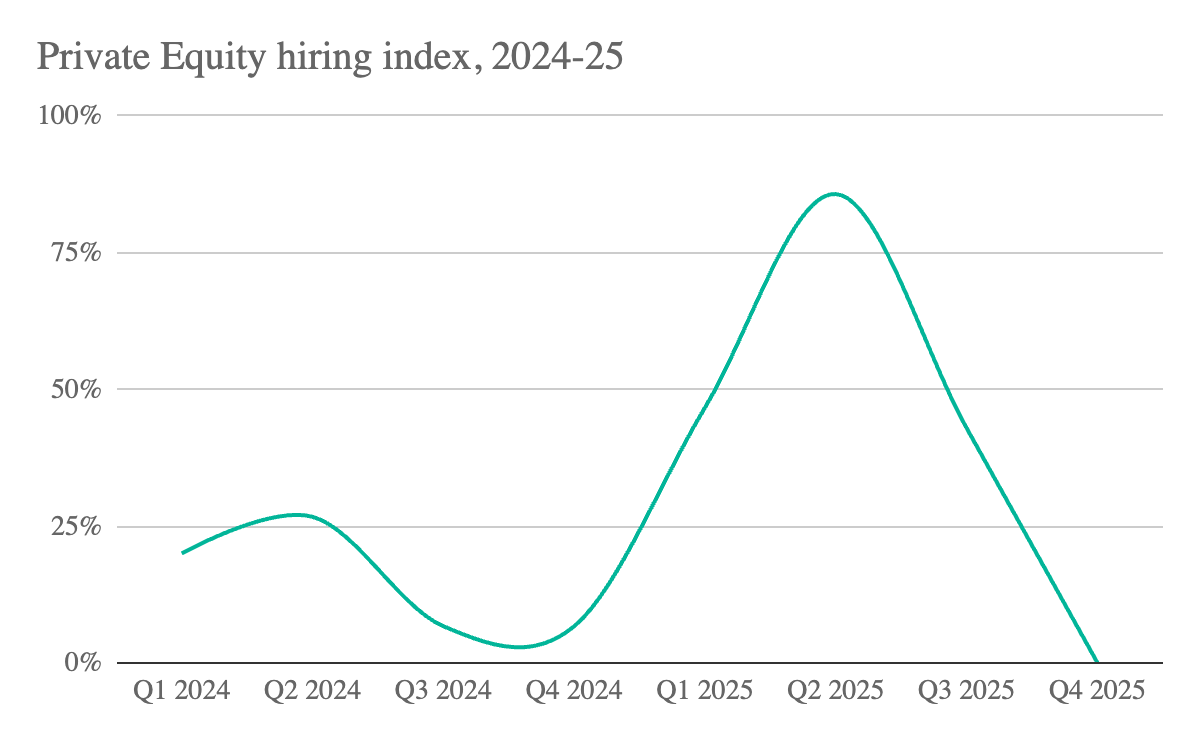
Whilst we’ve seen some variability in the PE hiring index, the difference over two quarters has been profound. Moving from 80% (a good market to hire in) to 4% (a very hard market to hire in) in just 6 months, shows how quickly the market can shift.
What’s driven the rapid turnaround in PE. We believe it’s two-fold:
- Q3 was a record of capital deployed in PE
- Continued focus on talent to drive operational improvement across the deal lifecycle

Large Enterprises/ Corporates
We’ve also seen the market tighten for strategy and transformation talent within Large Enterprises and Corporates.
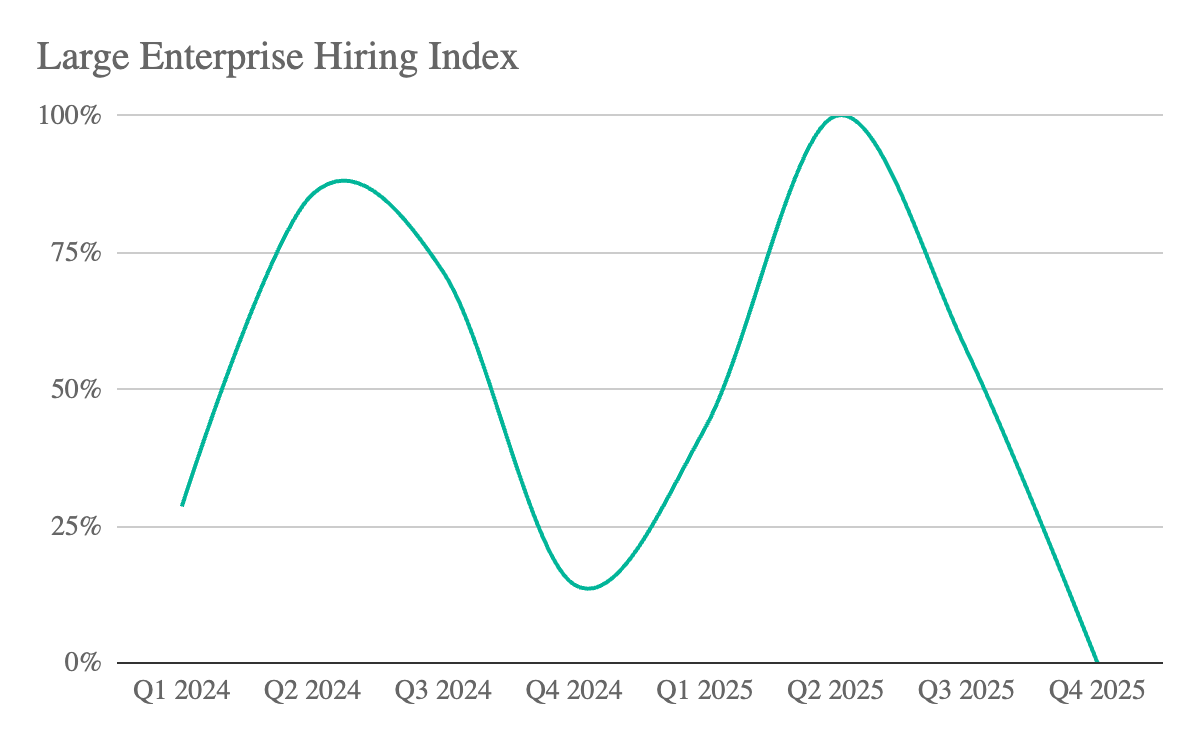
For Enterprise businesses, the sharp reduction in the hiring index appears to be driven less by increased hiring demand and more by a decline in candidate interest.
Our analysis of the hiring index by company type, a useful proxy for how attractive different organisations are to candidates, shows a clear pattern. While scale-ups, PE firms and consulting businesses perform similarly, Large Enterprises face a significant disadvantage when it comes to attracting strategy and transformation talent.
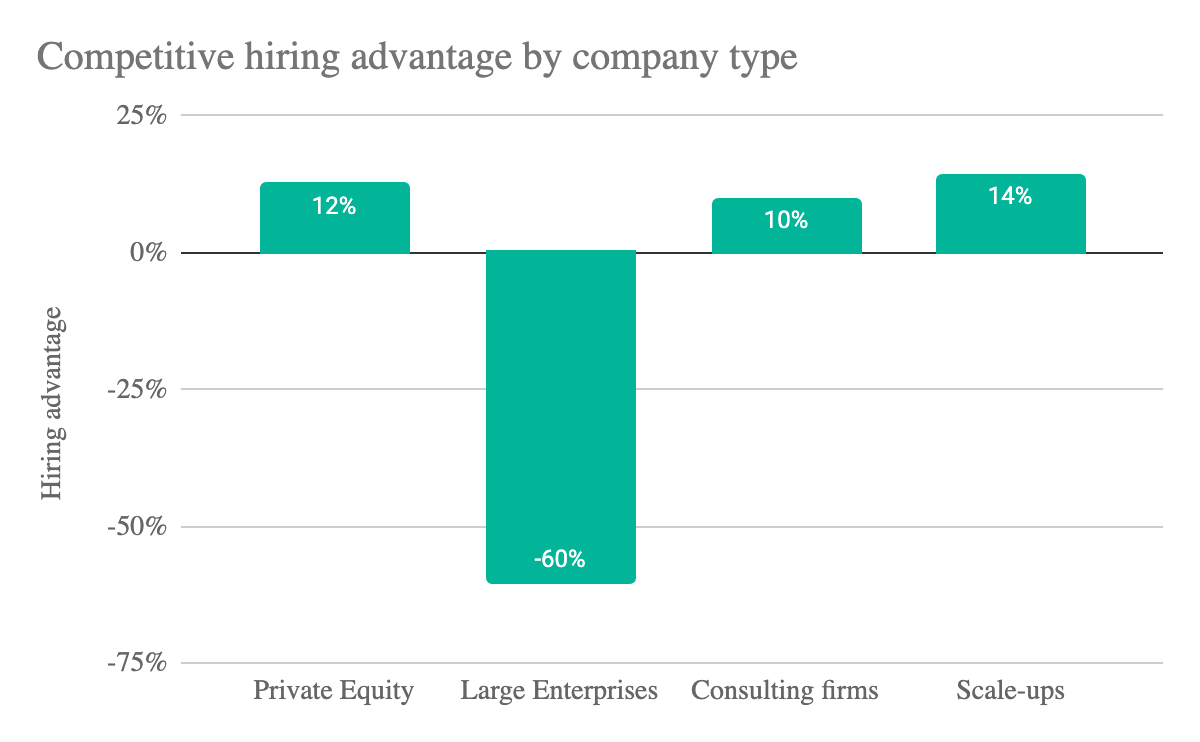
What’s next
Given the amount of Private Equity funds ready to be deployed, we find it very unlikely that things are going to slow down for the foreseeable future. If anything, given the number of Funds we’ve been speaking to who have mentioned deals on cusp of closing, things are likely to accelerate into Q1 next year.
To find out more about hiring with Movemeon get in touch with our team here.

Private Equity has become one of the most influential forces in business, outperforming public companies through disciplined value creation and exceptional talent strategy. This article explains how PE achieves its results and why demand for ex-consulting talent is rising across the industry.
Private Equity companies achieve productivity gains of 8% to 12% in the first two years after their acquisition, far outpacing the 2% to 4% gains that public companies typically see. In this article, we explore the growth of Private Equity as an industry, unpack how these firms achieve such outsized productivity improvements, and deep-dive into the increasingly critical role that ex-consulting talent plays in driving these transformations.
Today, Private Equity owns more of the UK’s largest companies than the public markets do
Private Equity has historically been seen as a niche sector - an alternative ownership structure which has attracted considerable media attention. But this characterisation no longer reflects reality. Over the last two decades, outsized returns have resulted in huge amounts of capital flowing into Private Equity.
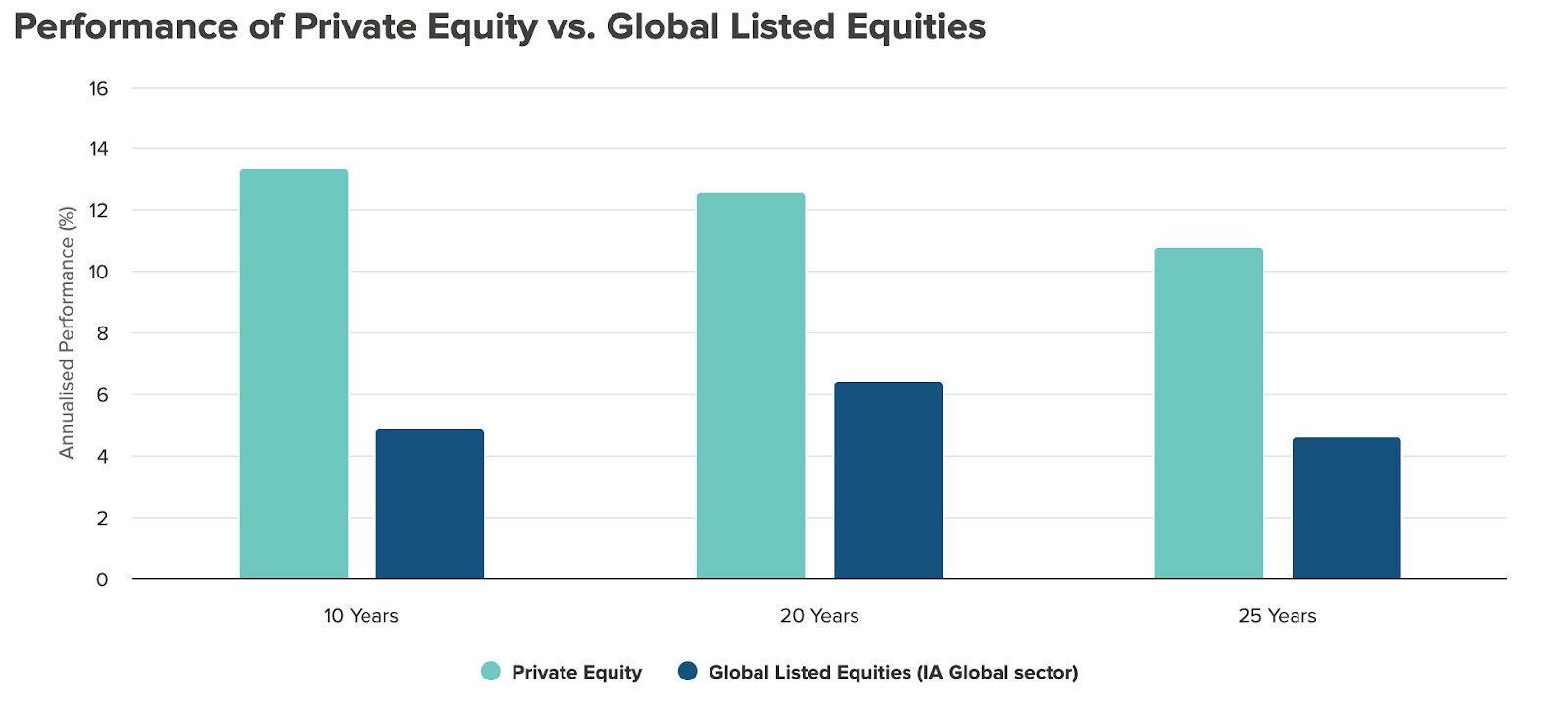
This has seen LPs (investors who contribute capital but do not actively manage the company - typically pension funds, insurance companies, etc.) increase their target allocation to PE from just 6% to over 8%. The result is a significant rise in PE-owned businesses. Of the UK’s largest 500 companies, McKinsey’s analysis shows that more are Private Equity-owned than publicly traded.

The Private Equity model has fundamentally changed
The Private Equity model has also fundamentally evolved. When interest rates were low, the cost of financing leveraged buyouts was extremely low. So funds were able to buy companies, increase the amount of debt at a very low cost, and get the added benefit of offsetting the cost of debt against taxation.
As interest rates have gone from sub 2% to 5%, the economics of this model have fundamentally changed. The cost of servicing the debt has more than doubled - putting much more pressure on the other side of the PE model: operational transformation.
Much focus goes on the PE value-creation levers. Typically they’re reflective of traditional commercial and operational transformation levers and are split into:
Top-line (impacting revenue):
- Commercial effectiveness (pricing, marketing, sales excellence)
- Technology (ERP)
- New markets / new products
Bottom-line (impacting cost):
- Operational effectiveness (lean, ops transformation)
- Cost-out (org design, target operating model)
- Procurement
And Private Equity companies have proved they’re very good at driving these changes: HBR found that PE-backed companies achieve productivity gains of 8% to 12% in the first two years after their acquisition - far outpacing the 2% to 4% gains that public companies typically see.
How does Private Equity achieve 8-12% productivity gains
HBR and McKinsey worked with 120 CEOs to analyse what PE-businesses do differently. They boiled it down to 6 main differences:
1. Conduct Full-Potential Due Diligence Continually
PE-backed firms constantly develop a “momentum case” (do nothing) and a “full potential case” (do everything), and continually re-evaluate priorities.
This ensures that decision-making stays aligned with value creation rather than inertia.
2. Build a Fit-for-Purpose Management Team
The CEO and senior team must deeply reflect the company’s value-creation thesis.
PE firms focus intently on securing talent not only in the C-suite but also one to two levels below, where execution truly happens.
3. Clean-Sheet Labour
Implement robust controls for headcount and prioritise building lean, high-performing teams.
In the PE model, talent density matters far more than organisational size.
4. Eliminate Bad Revenue
Regularly analyse revenue streams and cut unprofitable or low-margin lines that consume resources and dilute focus.
PE firms are unusually disciplined here, and it accelerates performance.
5. Execute Relentlessly
Break the firm’s value-creation thesis into 3-8 workstreams, each containing dozens or hundreds of initiatives.
This level of granularity allows early detection of bottlenecks and ensures momentum.
6. Treat Time as Capital
Boards and PE owners encourage CEOs to regularly analyse how they spend their time, ensuring it aligns with the company’s most critical priorities.
Time is treated as a finite, high-value resource, not a passive input.
What role does talent play in this
Central to all six practices is talent.
Ensuring the top 2-3 layers are exceptional and aligned to the value-creation thesis is non-negotiable.
Equally important is the shift from a traditional “talent pyramid” to a “talent density” model: fewer people, higher calibre, faster execution.
So what roles are PE funds hiring ex-consultants for - and why?
1. The key roles - Chief Transformation Officer, Operating Partners and Head of PMO
Private Equity has created some key roles to hold the business, and its Executive Team, accountable for delivery against the Value Creation Plan.
Chief Transformation Officer (CTrO)
A member of the Executive Team, usually part of the Management Incentive Plan, who is responsible for:
- constantly revisiting the strategy
- leading implementation
- holding executives to account
- coaching senior leaders and their teams
- working closely with the Fund to keep alignment tight
Bain analysis found that transformations with a CTrO deliver 24% more impact than those without.
The role has become one of the most important levers for executing high-stakes transformation at pace.
Operating Partner
A fund-level senior role, usually held by an experienced former C-level operator.
Operating Partners typically oversee two portfolio companies and work closely with Boards to ensure:
- the right people are in the right roles
- leaders receive targeted coaching and support
- information flow between the company and the fund is transparent and actionable
They serve as the strategic interface between the Fund and the business and are crucial to maintaining high accountability.
Head of PMO
A dedicated leadership role focused solely on overseeing execution of the Value Creation Plan.
They provide:
- visibility into progress across all initiatives
- structured reporting to the Board
- early identification of blockers and deviations
- the discipline needed to keep dozens (or hundreds) of workstreams moving
The Head of PMO role has grown sharply in importance as transformations become more complex and fast-paced.
2. Leveraging external experts
From the ongoing due diligence and clean sheet labour analyses, there will be regular skillsets and competencies identified that are required to achieve the Value Creation Plan. Private Equity is exceptional at deciding whether these are temporary requirements or ongoing - and for the former, whether an interim or consulting firm is best to achieve impact.
We’ve found a huge growth in our Agile consulting offering - a senior McKinsey, BCG or Bain Partner leading a team of Functionally focused ex-MBB consultants who have deep industry experience. This balance of a Partner overseeing the work alongside a team of real “operators” is driving a huge impact for Funds. Typically at a fraction of the price of traditional consulting offerings.
3. Assessing talent in Private Equity
Experience at a top-tier consulting firm (McKinsey, BCG, Bain etc.) combined with industry experience is considered baseline for these roles. What PE firms look for is the edge that differentiates one high-calibre candidate from another.
The focus is on:
Demonstrated impact
Candidates must show clear ownership of results, not just team or company achievements, but direct, attributable impact driven by their actions.
Unique industry experience
PE values candidates who have seen how others have solved similar problems.
Relevant industry exposure accelerates execution and reduces learning curves.
Functional alignment with the value-creation plan
Just as a CEO must align with the strategy, roles like CTrO or Head of PMO must have spikier strengths where the company is going, not just where it has been.
Private Equity has proven its ability to drive productivity improvements in short-time periods. Whilst the levers are well-known, the role of talent is critical. The playbook around clear roles to drive the Value Creation Plan is one that other companies can learn from - providing leverage and focus for Boards.
At Movemeon, we work with organisations across PE, consulting and high-growth sectors to help them identify, hire and develop the kind of leaders these CEOs described, people who bring breadth, accountability, resilience and real impact from day one. Whether you’re strengthening your senior team, building a succession pipeline or needing immediate execution power through interim talent, our network and expertise give you access to the highest-calibre operators, strategists and future CEOs.
Reference
Harvard Business Review (2025). What Every Company Can Learn from Private Equity.https://hbr.org/2025/11/what-every-company-can-learn-from-private-equity
To find out more about hiring with Movemeon get in touch with our team here.
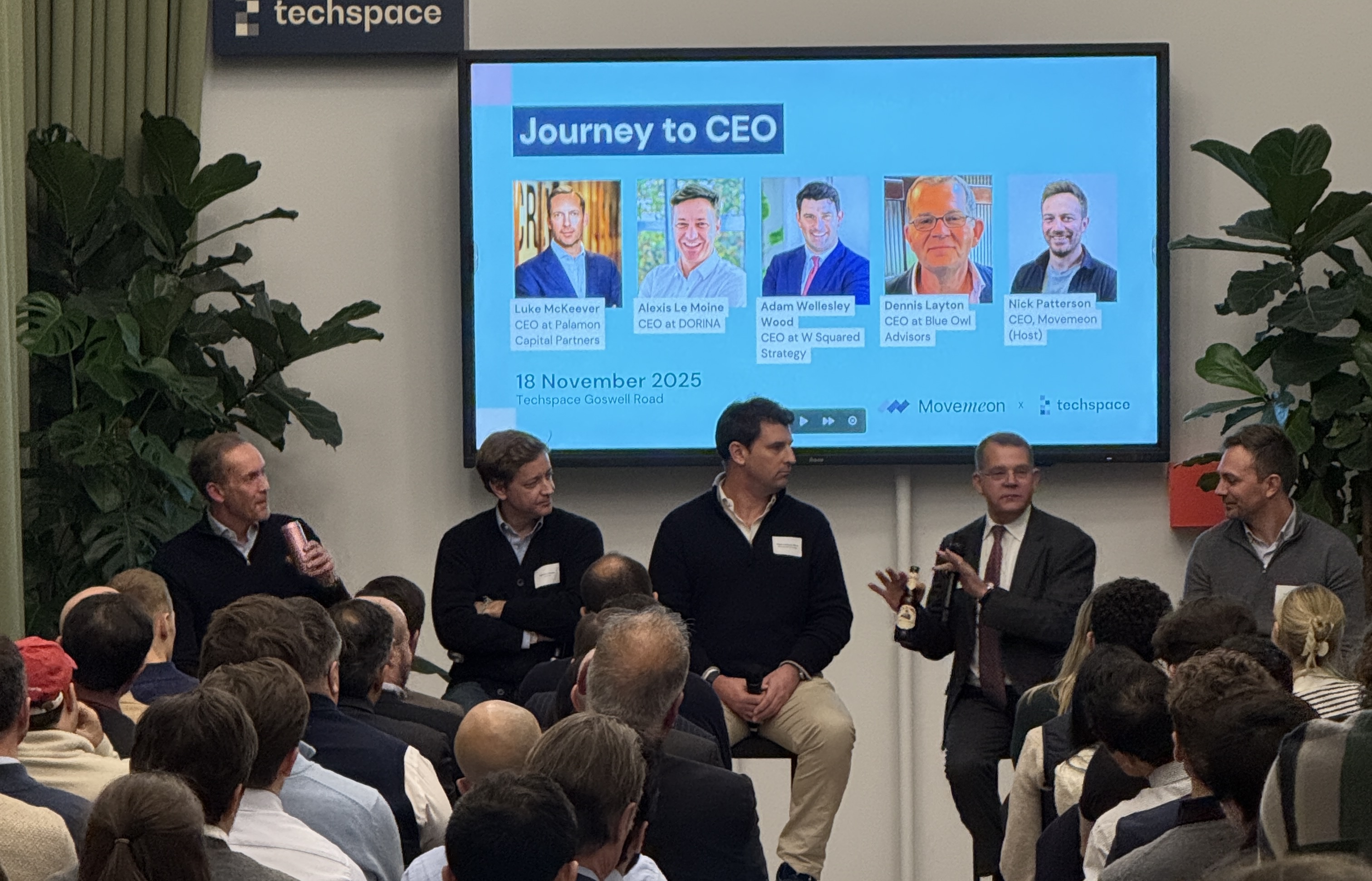
Earlier this week, we heard PE-backed CEOs share the candid lessons that shaped their careers and revealed what truly enables great leadership.
Earlier this week, we hosted an exceptional panel discussion with four leaders who have each carved their own path into the CEO role across private equity, public markets, consulting and multiple industries: Alexis Le Moine, CEO at Platinum Equity (PE) backed Dorina, Luke McKeever,CEO at Palamon Capital Partners (PE) backed Thomas International, Adam Wellesley Wood, CEO at W Squared Strategy and Dennis Layton, Founder and Managing Partner at Blue Owl Advisors. The level of candour, humour, and hard-earned wisdom shared on stage made this one of our most memorable events yet.
Here are the key themes that stood out.
1. Say “yes” more often, even when it feels irrational
A striking common thread across all four journeys was an almost reflexive willingness to say yes to opportunities, even when they were messy, undefined, unglamorous or came at unexpected moments.
Luke described this as the single biggest differentiator between people who accelerate and those who stall:
“The number of things you try matters far more than the length of time you do them.”
Alexis echoed this with humour and honesty, he accepted his CEO role after a Sunday interview “I had no idea what I was getting into but saying yes consistently created agility that paid off.”
The message was clear: careers don’t unfold linearly, and upward steps rarely look neat. The leaders who rise fastest collect breadth: roles, industries, geographies, and problems, not just senior titles.
2. Build a personal ‘bench’ long before you need it
Several CEOs emphasised a point that PE investors understand instinctively: speed matters, and you rarely have months to build out a team once you’re in the seat.
Leaders need people they trust before they land the big job.
Those who succeed think constantly about followership - who they’d want on their team, who believes in their leadership, and who will move with them.
This extended to advisors too. Many described having a handful of people - coaches, ex-colleagues, investors whom they treat as a personal board, meeting quarterly to stay grounded, challenged and mentally resilient.
3. Clarity on accountabilities is a superpower (and widely missing)
Despite how overused the language can be, the panel stressed how rare genuine clarity still is inside organisations.
“People say they know who’s responsible. But not who is on the hook, for what, by when?”
This level of precision with roles, ownership and decision rights is the backbone of successful transformations and fast-moving PE environments. It’s also why many CEOs prefer ex-consultants with a bias for structure and rigour.
When ambiguity creeps in, velocity dies.
4. Resource against the outcome date, not the job description
One of the most useful operational insights came from Dennis:
“The most important question is: when do you need the outcome? That determines whether you need an internal hire, an interim, or a consulting solution.”
He broke it down:
- 18 months to deliver?
You can hire a permanent external operator and ramp them. - 12 months?
You could look at an internal candidate or there may simply not be one in a lean PE-backed environment. - 6 months?
Bring in an interim/consulting solution who can hit the ground running and ship outcomes immediately.
This framing resonated across the room because of how often organisations misjudge timing and overestimate internal capacity.
5. Decision-making: intuition matters but only if you challenge it properly
The CEOs were refreshingly honest about the limits of data, especially in high-ambiguity situations. But they also cautioned against glorifying gut feel without discipline.
Luke shared a simple inversion:
“Use facts to disprove your intuition, not to prove it.”
Others advocated for deliberately engineering real challenge, not echo chambers:
“Close the door and say: pull my plan apart. Pick holes in it. The more you do that, the stronger the decision.”
Another powerful reminder: surround yourself with sparring partners who complement not mirror your style.
One CEO described hiring a CFO who “breaks my ideas into pieces every time” and valuing her all the more for it.
6. What CEOs wish they had known before taking the seat
A recurring theme: the CEO role is not the apex predator position people imagine, especially in PE.
Being a public company CEO can feel freer than being in a PE-backed business, where scrutiny is constant and directional pressure is explicit.
Yet what keeps CEOs energised includes:
- Choosing the people they work with
- Solving complicated, previously unsolved problems
- Owning difficult decisions
- Feeling deeply embedded in something meaningful
The job is demanding but it creates a sense of relevance and purpose that is difficult to replicate elsewhere.
7. The emotional resilience required is enormous
Adam spoke openly about executive loneliness. Alexis emphasised needing a coach.
The message was unequivocal:
“If you don’t work on your emotional fitness, the job will break you.”
The CEOs who thrive build support structures early and protect their lives outside work fiercely.
8. Mentor widely. Learn from everyone. Give back deliberately.
One of the most moving segments of the evening was on mentorship.
Dennis reframed mentorship beautifully:
“Everybody is a mentor if you’re open-minded. Everyone teaches you something.”
Alexis shared how he changed global policies at McKinsey to enable his route to parenthood, a reminder that personal missions can shape professional leadership.
The panel also described the joy of watching their mentees become CEOs, often surpassing them in success.
Mentorship, they agreed, is reciprocal. You take and you give.
9. And finally… don’t forget to ‘smell the frog’
It wouldn’t be a PE event without at least one memorable metaphor.
One CEO shared a story about an investor who promised major funding but, due to undisclosed illness, passed away before any capital materialised.
His reflection:
“Kiss every frog but smell it first.”
A powerful reminder to due diligence everything, even the parts that feel uncomfortable, like founder health, governance realities, and operational culture.
This event brought together over 100 senior leaders across strategy, consulting and private equity and the quality of conversation reflected both the ambition and honesty of the room.
The shared message:
The journey to CEO is rarely linear, never simple, and always defined by people - your network, your team, your mentors, and your own resilience.
If this conversation sparked reflections about your own career, or the emerging leaders inside your organisation, the OnUpBeyond Momentum Package is designed to support both sides of that journey. For individuals, it offers structured, expert-led guidance to sharpen your story, strengthen your CV and prepare for senior opportunities with clarity and confidence. For employers, it provides a scalable way to develop high-potential talent, helping future leaders build the breadth, resilience and decision-readiness that CEOs consistently highlighted during the event. If you’d like to explore how the Momentum Package can support you or your team, we’d be happy to share more.
Huge thanks again to our speakers, the Movemeon Strategy Roundtable community and the Techspace team for hosting us in such a fantastic venue.
Jamie Cameron
Head of Corporate, Movemeon
If you’d like to know any more about how you’d deploy either model, or would like to see some example projects get in touch with our team here.

Movemeon’s US GM on his career journey and how the firm is redefining hiring in the consulting and PE market.
Can you tell us a bit about your own career journey and what led you to take on the role of General Manager for Movemeon in the US?
I began my career working in the experiential marketing world, delivering experiences for some of the worlds largest brands and sports properties. We aimed to deliver best in class experiences for fans, consumers, and clients. I was very fortunate to work with many leading marketeers, whose attention to detail and client handling skills have been a strong foundation throughout my career. Since then, I have been leading and scaling disruptive teams and businesses, predominantly at the intersection of HR and technology, often working alongside first class ex-consulting minds.
Prior to Movemeon, I relocated to the US to launch and scale a high performance team at a fast growing UK tech company. I knew of Movemeon as they sourced some incredible candidates and placed some pivotal roles for the firm. When I heard they were hiring a GM, and looking to expand into the US, it felt like the perfect opportunity to draw upon so much of my experience and skillset as well as provide some cultural translation.
What was the vision behind bringing Movemeon (with its specialist hiring, consulting & interim services) to the US market?
I’m very lucky - Movemeon has an incredible track record, candidate network, list of clients and brand recognition in Europe. The team had already spent a few years laying the groundwork in the US by building out our candidates and getting global referrals to clients. Given the success of the business in Europe, expanding into the largest and most mature consulting market was a matter of ‘when’ not ‘if’.
In your experience, what does Movemeon do differently or better than traditional hiring / consulting firms in the US?
What sets Movemeon apart is our engaged network of over 100,000 candidates globally in a very specialist area - current and former strategy consultants. On top of that, our tech driven delivery model means we can engage with better candidates faster than traditional methods.
Can you share some case studies or stories from US companies that illustrate how Movemeon solved a tough hiring or consulting problem?
On a recent call with the Head of Talent for a well known large cap PE firm, they mentioned they were currently hiring for a very specific role on the operating team and gave a one line description of a candidate they were looking for. Within 72 hours we had surfaced the perfect candidate whose background and resume literally “wrote the job description”.
In another recent scenario, a client rang us to say they’d been struggling with a very important role for almost a year, whilst it was slightly outside of our wheelhouse, we were able to agree a model that worked for both sides, and through our network, pull together a very strong shortlist within two weeks. We currently have a candidate in the final round for the role.
If you had to sum up in one sentence what companies in the US should expect if they work with Movemeon, what would that be?
A refreshing approach to a traditionally antiquated industry, through a high-touch and personal service, driven by a tech delivery model.
Looking ahead, what are your ambitions for Movemeon in the US over the next few years - whether that’s new services, industries, or ways of working with clients?
The US is Movemeon’s fastest growing market globally, both on the candidate and client side, and it’s only going to continue accelerating. We’re particularly seeing huge growth in the Private Equity vertical and we’re already growing the team to support, watch this space!
Looking for the best talent in the US? Let us help.

Consulting disrupted: Clients demand flexibility, execution expertise, and lower fees as traditional firms face competition from interim executives and agile consulting teams.
Consulting is going through a seismic shift. After years of double-digit growth, the combination of a tough macro-economic climate and more alternatives in the form of independent consultants and in-house ex-consulting talent is challenging the very foundations consulting is built on.
In this article, we talk through how we’re seeing client demands for consulting and advisory support shifting, and what this means in terms of a new landscape of advisory support.
If you’d like to know any more about how you’d deploy either model, or would like to see some example projects get in touch with our team here.
Is consulting no longer recession-proof?
The old adage explains that you need consultants in the good times and the bad. As such the industry had historically been seen as largely recession-proof. This "professional services” resilience has resulted in an interest from private capital markets over the last few years, but is this being challenged in the consulting market?
Ten years ago, HBR first referenced “consulting on the cusp of disruption”. The post-COVID boom resulted in pay rises, over-hiring and an increasing reliance on non-core strategy work. This meant few in the industry were prepared for the correction in 2022-23.
We highlighted what we saw in the industry, both from a client perspective and in the consulting firms:
On the client side:
- There’s increased need for deep industry experience
- Fees have reached unsustainable levels and typical delivery models are too rigid
- Quality isn’t what it used to be
Which has started to have knock-on effects to the consulting industry:
- Top performing partners leaving to launch boutiques
- Rise of quality in the freelancer market
- Change from AI on the horizon
How is the market now responding?
The growth of consulting firms in the post-COVID era was driven by providing more advice outside of the core of strategy. Clients had found returns on bringing in expertise to help drive implementation, analytics and new products/ services. By January 2023, the Kennedy Research Reports found that strategic advisory had fallen to just 10% of the consulting industry’s revenue - from 17% just five years earlier.
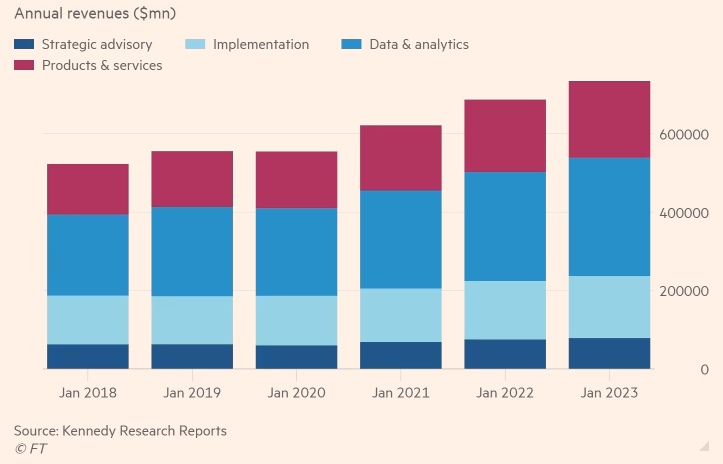
The 10% of strategy work, which grew very little over the last five years, is seeing less disruption: Large Cap PE funds are still turning to McKinsey, BCG and Bain for due diligence, and development of the Value Creation Plan; the Boards of large corporates and enterprises are still choosing to get the assurance of one of these firms on the once in a decade decisions.
However, for longer-term implementation, transformation projects and new market entry projects, we’re seeing a shift away from the traditional firms. PE and Enterprise clients are conscious they don’t have the capability or capacity to deliver these in-house. They are also aware that experts who have overseen similar projects countless times will help them avoid the pitfalls and maximise ROI. However, they are unwilling to spend the fees commanded by the traditional firms - especially when the delivery models designed around strategy projects (Partner only part-time; EM+2 team) are so rarely flexible, and the Partners at these firms often don’t have real operating experience.
This has meant that very few believe MBB defend their cost when implementing large change programs - 84% of executives saying that MBB were “no help at all” in a recent Emergn survey about change projects:
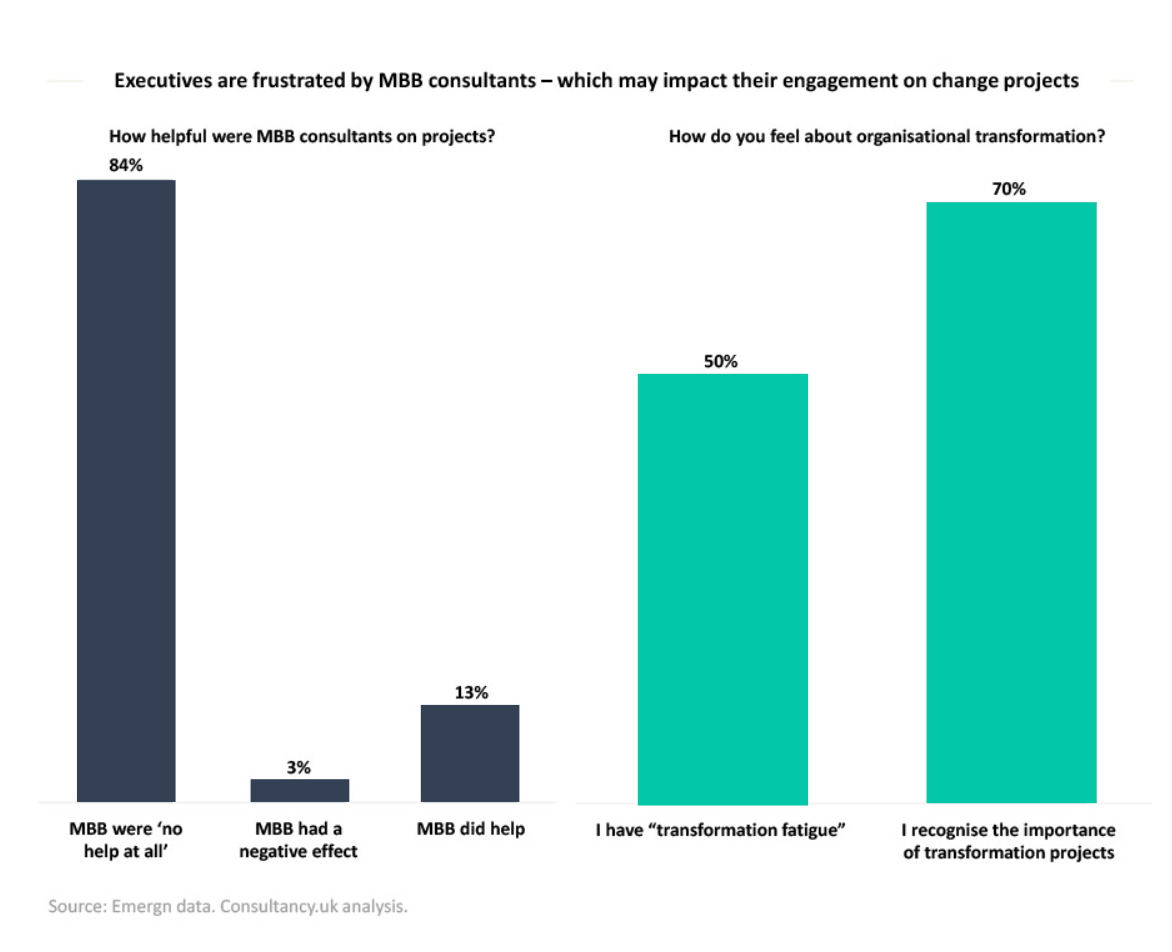
A new breed of competition and the risk of marketing myopia
Theodore Levit is often quoted by consultants. They’ve explained to many clients that focusing on delivering value must always usurp the pressures of continuing to sell current products and services. Kodak and Blockbuster are often cited as examples of not doing so.
It’s definitely time the consultants heed their own advice. Consulting for many years has been able to defend its price point through exceptional solutions and effective communication of these. There’s almost a bit of magic about how they get there. However, it is fundamentally a people business. And we’re increasingly seeing clients shifting towards other ways to access these people.
Twenty years ago the consulting alumni world was still pretty small. The firms were growing but not many had been through their intense training and coaching. As they’ve continued to grow, the alumni networks and number of “consulting trained” experts has grown exponentially. We’ve seen rapid growth for two types of advice: interim experts and agile consulting teams.
Interim experts - embedded senior executives with deep operating experience
Typical roles and cost: The majority of the demand we find for interim executives are either roles responsible for overseeing a change (Chief Transformation Officers / Head of PMO) or are bringing in deep expertise (Chief Procurement Officer, Head of Pricing / Sales Excellence). The transformation roles tend to be 6-18 months in length; the experts normally 3-5 months.
Typical profiles: A combination of ex-top tier consulting (ensures they can effectively work alongside the executive team) and deep operating experience. They’ve typically worked in industry in a senior or executive role for 5-10 years. This means they know what it takes to deliver real change. Day rates will vary a lot on profile and length of project, but are typically £1.5k - £4k.
What they offer that a consulting firm can’t: There are two main drivers: time and “operating experience”. For time, interim executives are the equivalent of a “Partner” on a consulting project. Typically with Partners, they are spread between multiple projects and as such you likely only get 1-2 days of their time a week. With an interim executive, you get them 100% of the time. Secondly, they all bring deep “operating” experience. Many consulting Partners have worked their way up through consulting, without having held senior roles in PE or Industry.
Agile consulting teams: flexible, specialist, end-to-end
As part of our own consulting offering, we’re seeing client demand and ex-MBB Senior Partner supply converge across a number of specialism areas as outlined below.
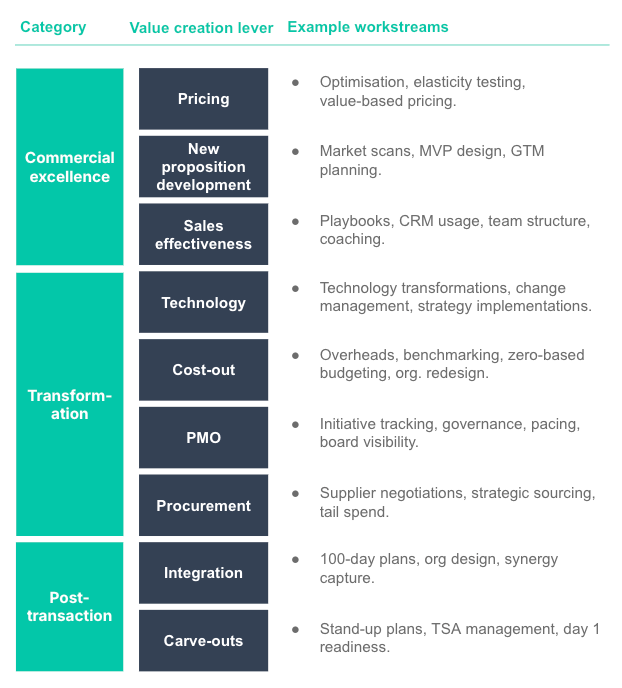
Typical projects and cost: Complex decisions that need deep expertise. They are typically the main 2-3 initiatives post strategy development, and include new market entry, operational improvement, organisational design, procurement review, pricing strategy etc. They are high-impact projects that often have a big bottom-line impact. Cost varies on team composition, but typically ranges between £20-50k per week.
Typical profiles: Agile consulting firms are often led by an ex- senior Partner from McKinsey, BCG, Bain or equivalent, who leverages deep functional expertise from interims (as above).
What they offer that a consulting firm can’t: While the ex-MBB Partners ensure the same level of assurance that you’d see with one of the large consulting firms, they are able to offer much more flexible models and deeper industry / operating experience. The flexibility starts with themselves, with potential to be anywhere between 100% staffed on a project to hardly involved - and they will flex up and down the team over the project lifetime. They also offer deep industry expertise, and are able to assemble an exceptional team of interims with backgrounds spanning a plethora of consulting firms and with the requisite functional / industry operating experience.
If you’d like to know any more about how you’d deploy either model, or would like to see some example projects get in touch with our team here.
Agile consulting delivering value in practice
To expand on this with some concrete examples from our own work, we’ve summarised some key challenges we’ve recently seen from clients and outlined why the agile consulting approach worked below:
Operational improvement for a PE-backed manufacturing business
A nationwide UK manufacturer, owned by a £50bn AUM PE fund, needed rapid EBITDA uplift across its product portfolio. An agile consulting team was assembled by Movemeon Consulting to deliver impact within 2 months, with a team comprising:
- Partner: Ex-McKinsey Senior Partner with over 20 years’ experience in operational improvement and manufacturing diagnostics;
- Engagement Manager: 5 years at McKinsey, followed by senior strategy and PE-backed operational roles;
- Associate: Ex-Bain Manager with deep regulated manufacturing experience;
- Analysts: Ex-LEK and Bain, both with operating experience and strong financial modelling / PE exposure.
The challenge: Performance varied widely across sites, with underperformance dragging on overall profitability. The client needed a clear diagnostic and pragmatic turnaround roadmap, executed at speed.
The outcome: The team’s diagnostic identified 7 underperforming sites, developed tailored turnaround plans, and began embedding operational workstreams. The impact was so strong that the client permanently hired the EM from the agile team to continue the transformation.
Why agile consulting worked: This bespoke mix of ex-MBB consultants and operators, led by a senior industry expert, gave the client tier-one insight at pace and cost-efficiency, without the overhead of a traditional consulting firm.
The result: Sustainable operational improvement, delivered by a right-sized, high-calibre team.
Commercial strategy and PMI for a global consumer business
A $5bn consumer business, carved out by a $100bn+ AUM PE fund, required a new commercial strategy and seamless post-merger integration to set up the business for growth. A lean, agile consulting team was assembled to deliver across 12 months, consisting of:
- Sales Excellence & Transformation Director: 20 years’ operating experience at Expedia and Whitbread, with deep expertise in sales excellence, transformation, and commercial operations.
- Senior Consultant: Former BCG Senior Consultant with 5 years’ operating experience in high-growth tech businesses, notably having led PMI for consumer-focused businesses in 20+ countries.
The challenge: The carve-out created a need to stand up commercial functions from scratch, while simultaneously implementing a robust sales excellence strategy to accelerate performance across global markets.
The outcome: The agile team successfully established commercial functions, delivered a scalable sales excellence strategy, and ensured seamless integration across units. The impact was lasting - the client made a permanent hire of the Sales Excellence & Transformation Director to continue driving results post-project.
Why agile consulting worked: By combining a former BCG strategist with a seasoned transformation operator, the client gained a tailored, high-impact team able to deliver both strategic clarity and operational execution - faster and more effectively than a traditional consultancy.
The bottom line
Transformation isn’t just about ideas - it’s about embedding change. Strategy may set the direction, but execution decides whether the journey is completed.
Consulting firms are built around making the key and critical strategic decisions. And they are extremely effective at doing so. However, when it comes to driving the change and transformation, the operational expertise and flexibility offered by interim talent and agile consulting teams is increasingly out-competing the consultancies.
If you’d like to know any more about how you’d deploy either model, or would like to see some example projects get in touch with our team here.
.png)
Join Joe and Tobias exploring the intersect between Private Equity value creation & AI strategy.
In this 20-minute conversation, Tobias Haefele and Joe Siantonas share their perspectives on how artificial intelligence is transforming private equity. From the early days of data-heavy machine learning projects to today’s practical GenAI applications, Tobias outlines where funds can unlock real value, from back-office automation and customer support to product innovation and portfolio growth.
They also explore the role of strategy consultants in AI transformation, the skills funds need to build effective AI squads, and what the next five years could look like as the hype fades and adoption matures.
Curated opportunities, for the leaders of today & tomorrow
Exclusive jobs, projects & data-driven insights to support your career success.
Join your peers & create a free account. Discover roles in under five minutes.



.jpg)

.png)
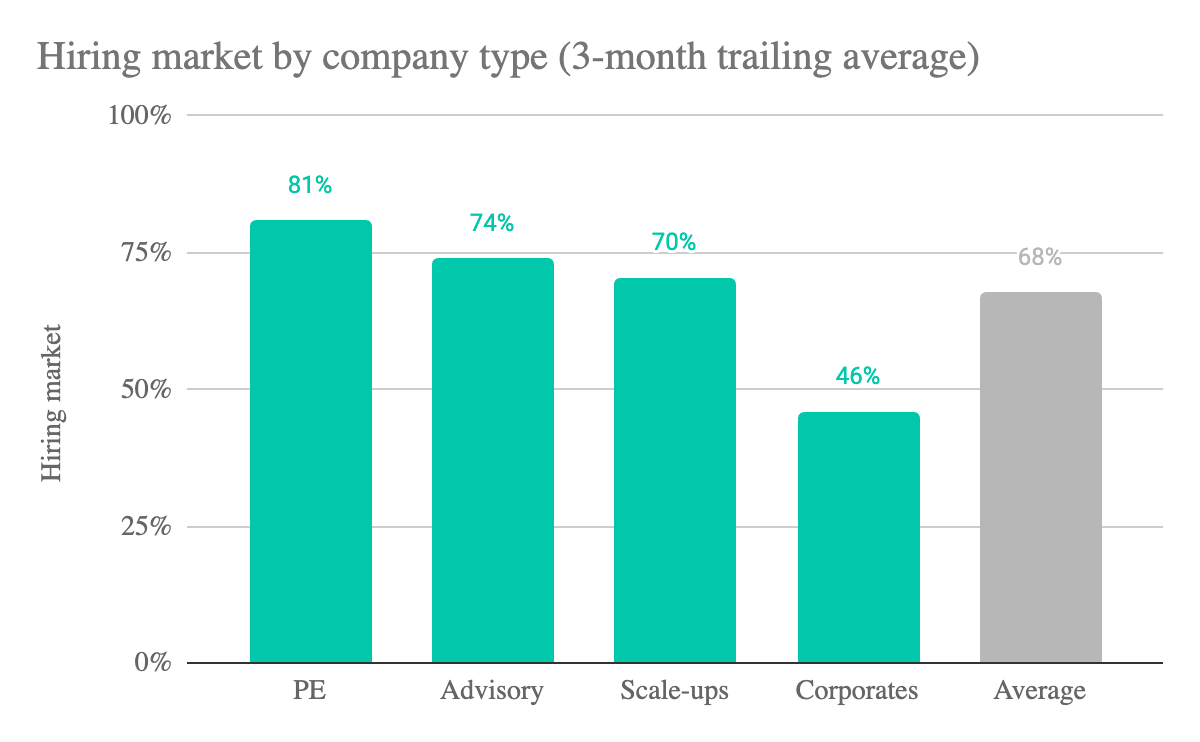
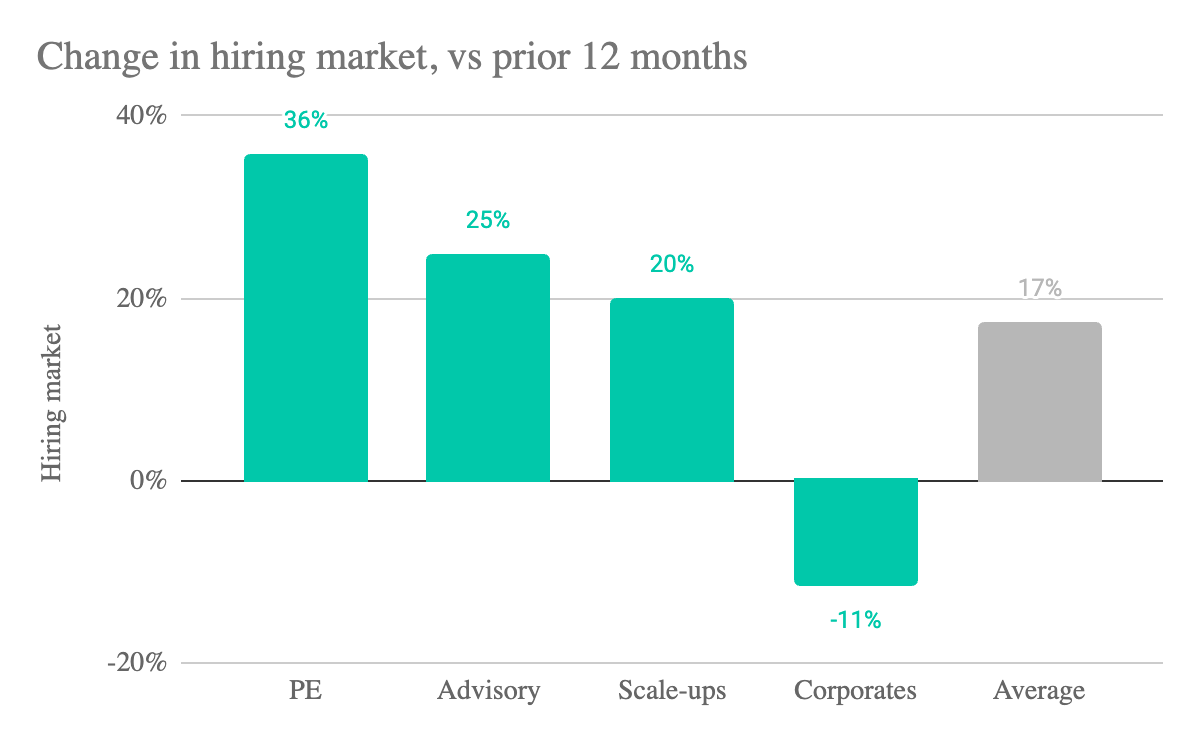


.jpg)


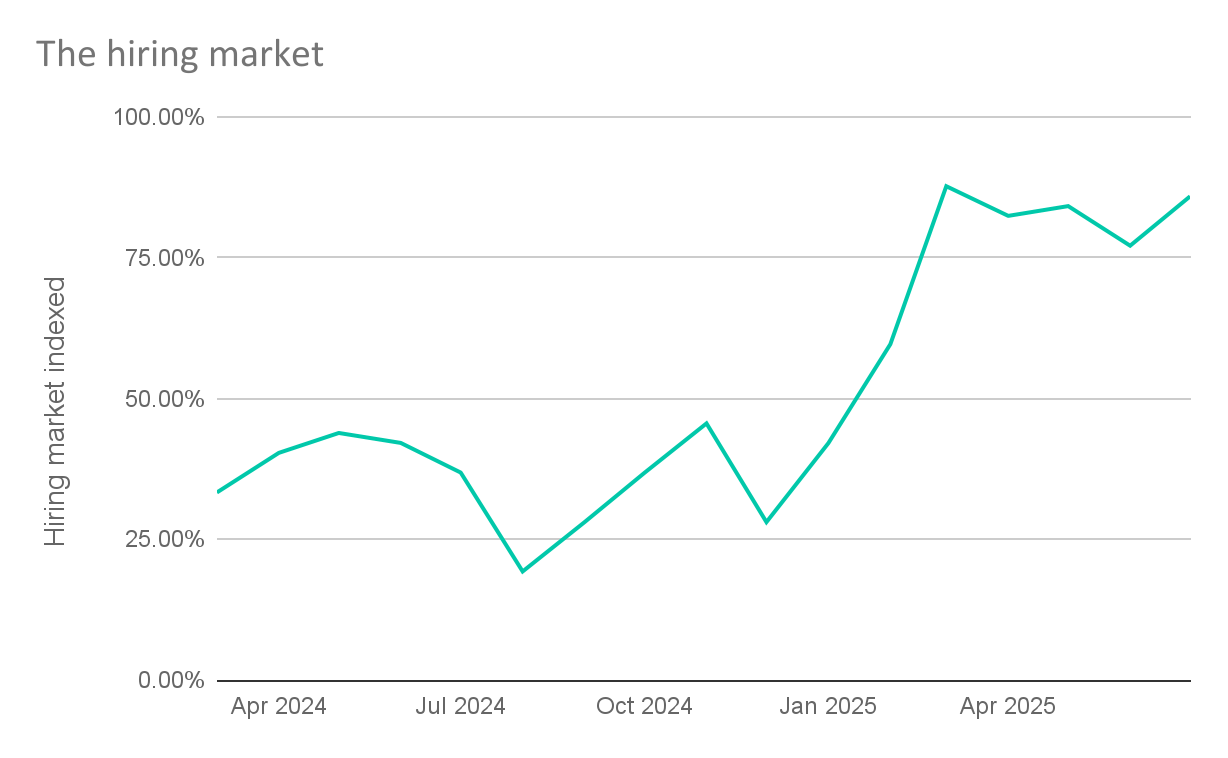



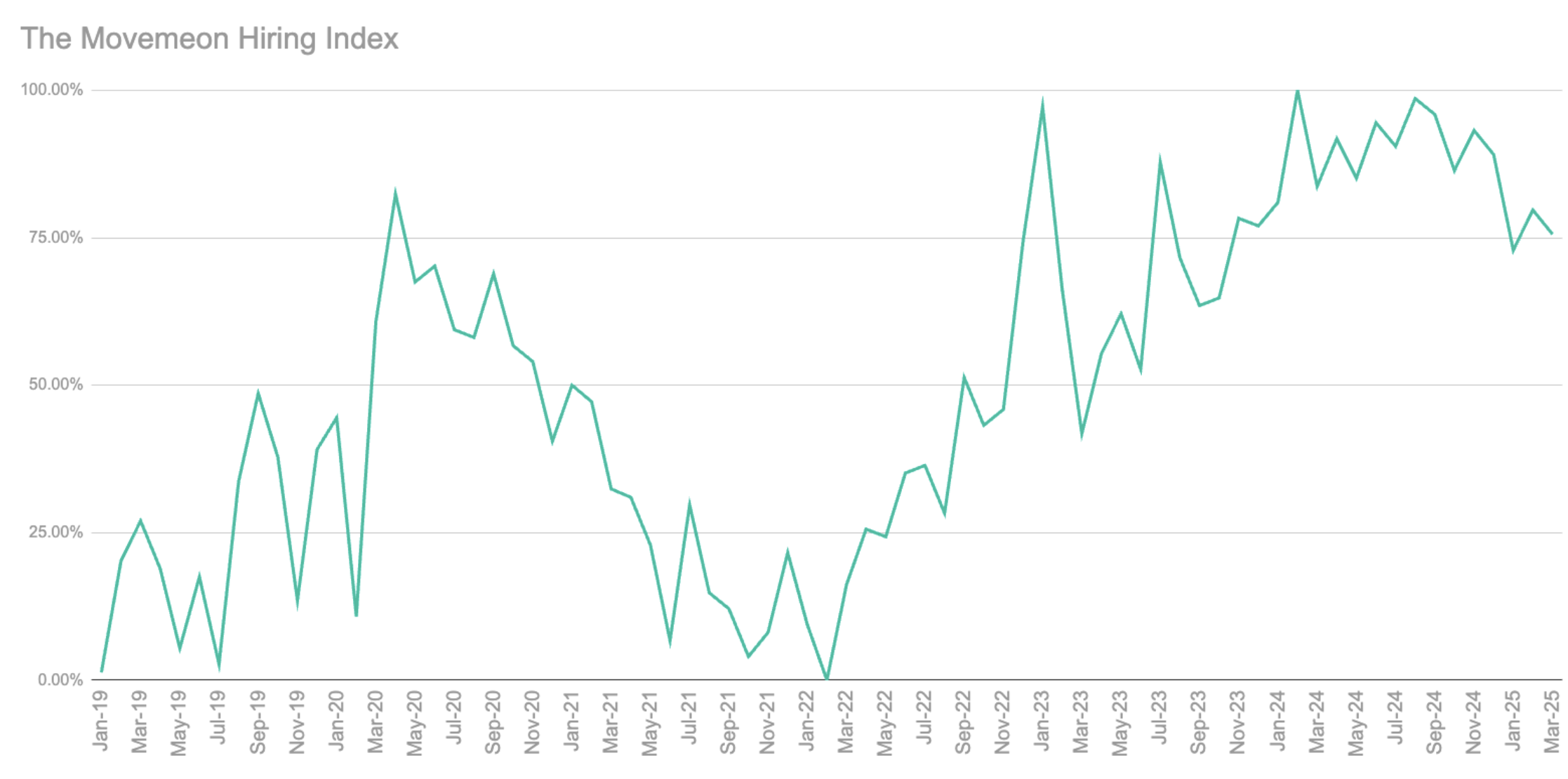



















.jpg)

